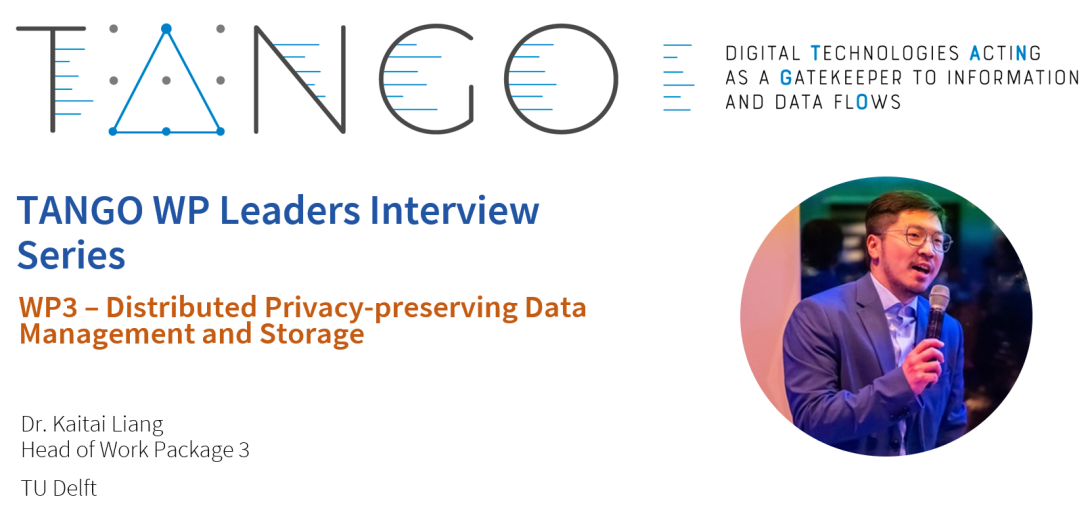TANGO WP Leaders Interview Series – WP3 Distributed Privacy-preserving Data Management and Storage

In this exclusive interview, we speak with Dr. Kaitai Liang, the head from TANGO work package 3 (WP3), to explore the technologies, challenges, and innovations behind privacy-preserving data management. Learn how user-centric design, advanced encryption, and real-world pilot feedback are shaping a secure and transparent digital future.
How would you describe the purpose of WP3 in one sentence?
The purpose of the "Distributed Privacy-preserving Data Management and Storage" work package is to develop a decentralized data-sharing ecosystem using blockchain that ensures dynamic trust assessment, risk-based security, user data ownership, and confidentiality (including for non-personal data).
Which technologies in WP3 have impressed you the most from a technical point of view?
Confidentiality and privacy by design are central to secure data access in distributed environments. This is achieved by embedding fine-grained access controls and cryptographic safeguards into the system architecture. The proposed solution uses two parallel processes integrated into the data space connector. One enforces user consent and access rights via the XACML framework and verifiable credentials from the SSI module, while the other employs CP-ABE to encrypt data based on attribute-driven policies. In scenarios requiring enhanced security, a dual-layer encryption approach is applied – data is first encrypted through the SEDSS (Self-Encryption and Decryption) module, and the decryption key is then protected using CP-ABE. This ensures that only authorized users with the correct attributes can access the data, even in untrusted environments.
Which tools from WP3 seemed to engage end users the most across the pilots?
The Policy Enforcement Point (PEP) component supports various pilots by enabling service access authorization – for example, Smart Hospitality (access to Privacy Assurance Tool (PAT) and Exploratory Data Analysis Engine (EDAE) tools), Autonomous Vehicles (car service and map access), Smart Manufacturing (upload/download of printing designs via CP-ABE), RIASTONE (access to the RIAS system), and Retail (access to EDAE). CP-ABE enhances data confidentiality by enabling fine-grained access control, especially in Autonomous Vehicles and Smart Manufacturing pilots. It also supports a hybrid encryption mode when combined with SEDSS for stronger data protection.
What are the main challenges in building a distributed, privacy-preserving data management system?
Building a distributed, privacy-preserving data management system presents several key challenges, including ensuring secure and efficient data sharing across decentralized nodes without compromising user privacy. Maintaining data confidentiality, integrity, and traceability in untrusted environments requires advanced encryption, access control, and trust mechanisms. Further complexity is added by the need to achieve dynamic trust assessment, scalable multi-factor authentication, and secure key management without centralized control. Additionally, balancing usability, performance, and compliance with data protection regulations poses significant design and implementation hurdles.
How does WP3 ensure that sensitive or personal data remains confidential in a distributed environment?
We have designed an energy-efficient blockchain-based platform for secure, distributed data management, sharing, and storage, building on the existing Fides solution used for fraud prevention in data exchange. The system will ensure compatibility with current blockchain and DLT technologies, while preserving user privacy through decentralized storage frameworks. To reduce energy and computational costs, only unique identifiers will be stored on-chain, with actual data distributed off-chain. Interoperability will be supported via Gaia-X-compliant gateways and IDS connectors. The TANGO platform integrates with SSI and trust management for secure access control, ensuring users retain full ownership of their data. GDPR compliance will be addressed through policy-based and sticky access controls, with advanced cryptographic techniques, such as CP-ABE, self-encryption schemes providing confidentiality, and user consent enforcement. Identity verification leverages diverse attributes – including phone number, education, and behavior – enabling secure, trackable data sharing with time-bound access.
How do you ensure that users retain control over their data throughout its lifecycle?
Users retain control over their data throughout its lifecycle through mechanisms such as SSI for managing access rights, policy-based and sticky access controls that enforce usage conditions, decentralized storage with self-encryption to secure and distribute data, and consent management aligned with GDPR to ensure explicit, revocable user permissions.
What advantages does the self-encryption and multi-factor recovery system offer over traditional encryption methods?
The self-encryption and multi-factor recovery system offers significant advantages over traditional encryption by enhancing data security, privacy, and user control. It enables data to be encrypted and fragmented locally, eliminating the need for centralized key storage and reducing the risk of single points of failure. Users retain full ownership and control over their data, with access governed by multiple authentication factors, making recovery both secure and flexible. This approach also strengthens resistance to attacks, ensures confidentiality even in untrusted environments, and supports privacy-preserving storage and sharing in decentralized systems.